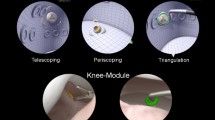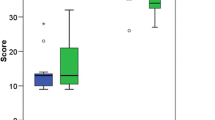Abstract
Purpose
To develop and validate a novel score to more objectively assess the performance of diagnostic knee arthroscopy using a simulator.
Methods
A Diagnostic Arthroscopy Skill Score (DASS) was developed by ten AGA (AGA-Society for Arthroscopy and Joint-Surgery) instructors for the assessment of arthroscopic skills. DASS consists of two parts: the evaluation of standardized diagnostic knee arthroscopy (DASSpart1) and the evaluation of manual dexterity, including ambidexterity and triangulation, using objective measurement parameters (DASSpart2). Content validity was determined by the Delphi method. One hundred and eleven videos of diagnostic knee arthroscopies were recorded during simulator training courses and evaluated by six specially trained instructors using DASS. Construct validity, measurement error calculated by the minimum detectable change (MDC), internal consistency using Cronbach’s alpha and interrater and intrarater reliability were assessed. The Bland–Altman method was used to calculate the intrarater agreement.
Results
Six skill domains were identified and evaluated for each knee compartment. DASS, DASSpart1, and DASSpart2 showed construct validity, with experts achieving significantly higher scores than competents and novices. MDC was 4.5 ± 1.7 points for DASSpart1. There was high internal consistency for all domains in each compartment from 0.78 to 0.86. The interrater reliability showed high agreement between the six raters (ICC = 0.94). The evaluation of intrarater reliability demonstrated good and excellent agreement for five raters (ICC > 0.80) and moderate agreement for one rater (ICC = 0.68). The Bland–Altman comparison showed no difference between the first and second evaluations in five out of six raters. Precision, estimated by the regression analysis and comparison with the method of Bland and Altman, was excellent for four raters and moderate for two raters.
Conclusions
The results of this study indicate good validity and reliability of DASS for the assessment of the surgical performance of diagnostic knee arthroscopy during simulator training. Standardized training is recommended before arthroscopy surgery is considered in patients.
Level of evidence
II.





Similar content being viewed by others
References
Anetzberger H, Mohr M, Eickhoff HJ, Seibert FJ, Döring B, Reppenhagen S (2021) Drei Jahre AGA simulator training Arthroskopie. Ein Erfahrungsbericht. Arthroskopie. https://doi.org/10.1007/s00142-020-00428-5
Bartlett JD, Lawrence JE, Stewart ME, Nakano N, Khanduja V (2018) Does virtual reality simulation have a role in training trauma and orthopaedic surgeons? Bone Jt J 100-B:559–565
Bartlett JD, Lawrence JE, Yan M, Guevel B, Stewart ME, Audenaert E, Khanduja V (2020) The learning curves of a validated virtual reality hip arthroscopy simulator. Arch Orthop Trauma Surg 140:761–767
Baumann Q, Hardy A, Courage O, Lacombes P, Accadbled F (2019) Lessons taught by a knee arthroscopy simulator about participants in a European arthroscopy training programme. Orthop Traumatol Surg Res 105:287–291
Bayona S, Akhtar K, Gupte C, Emery RJ, Dodds AL, Bello F (2014) Assessing performance in shoulder arthroscopy: The Imperial Global Arthroscopy Rating Scale (IGARS). J Bone Jt Surg Am 96:1–7
Bland JM, Altman DG (1986) Statistical methods for assessing agreement between two methods of clinical measurement. Lancet 1:307–310
Bonett DG (2002) Sample size requirements for estimating intraclass correlations with desired precision. Stat Med 21:1331–1335
Cychosz CC, Tofte JN, Johnson A, Gao Y, Phisitkul P (2018) Fundamentals of arthroscopic surgery training program improves knee arthroscopy simulator performance in arthroscopic trainees. Arthroscopy 34:1543–1549
Dreyfus HL (1986) Five steps from novice to expert. In: Dreyfus HL, Dreyfus SE (eds) Mind over machine: the power of human intuition an expertise in the era of the computer. Basil Blackwell, Oxford, pp 16–51
Elliott MJ, Caprise PA, Henning AE, Kurtz CA, Sekiya JK (2012) Diagnostic knee arthroscopy: a pilot study to evaluate surgical skills. Arthroscopy 28:218–224
Fink A, Kosecoff J, Chassin M, Brook RH (1984) Consensus methods: characteristics and guidelines for use. Am J Public Health 74:979–983
Hohmann E, Brand JC, Rossi MJ, Lubowitz JH (2019) Proficiency-based training using simulator-based tools could be validated for certification of surgical procedural proficiency. Arthroscopy 35:3167–3170
Insel A, Carofino B, Leger R, Arciero R, Mazzocca AD (2009) The development of an objective model to assess arthroscopic performance. J Bone Jt Surg Am 91:2287–2295
Karam MD, Pedowitz RA, Natividad H, Murray J, Marsh JL (2013) Current and future use of surgical skills training laboratories in orthopaedic resident education: a national survey. J Bone Jt Surg Am 95:2e4
Koehler RJ, Amsdell S, Arendt EA, Bisson LJ, Braman JP, Butler A, Cosgarea AJ, Harner CD, Garrett WE, Olson T, Warme WJ, Nicandri GT (2013) The arthroscopic surgical skill evaluation tool (ASSET). Am J Sports Med 41:1229–1237
Koo TK, Li MY (2016) A guideline of selecting and reporting intraclass correlation coefficients for reliability research. J Chiropr Med 15:155–163
Luzzi A, Hellwinkel J, O’Connor M, Crutchfield C, Lynch TS (2020) The efficacy of arthroscopic simulation training on clinical ability: a systematic review. Arthroscopy. https://doi.org/10.1016/j.arthro.2020.09.018
Middleton RM, Baldwin MJ, Akhtar K, Alvand A, Rees JL (2016) Which global rating scale? A comparison of the ASSET, BAKSSS, and IGARS for the assessment of simulated arthroscopic skills. J Bone Jt Surg Am 98:75–81
Moosbrugger H, Kelava A (2020) Qualitaetsanforderung an Test und Fragebogen („Guetekriterien“). In: Moosbrugger H, Kelava A (eds) Springer, Berlin, pp 13–28
O’Neill PJ, Cosgarea AJ, Freedman JA, Queale WS, McFarland EG (2002) Arthroscopic proficiency: a survey of orthopaedic sports medicine fellowship directors and orthopaedic surgery department chairs. Arthroscopy 18:795–800
Olson T, Koehler R, Butler A, Amsdell S, Nicandri G (2013) Is there a valid and reliable assessment of diagnostic knee arthroscopy skill? Clin Orthop Rel Res 471:1670–1676
Pedowitz RA (2019) Editorial commentary: inexpensive training tools can facilitate basic arthroscopy education. Arthroscopy 35:605–606
Preston CC, Colman AM (2000) Optimal number of response categories in rating scales: reliability, validity, discriminating power, and respondent preferences. Acta Physiol (Oxf) 104:1–5
Price AJ, Erturan G, Akhtar K, Judge A, Alvand A, Rees JL (2015) Evidence based surgical training in orthopaedics: how many arthroscopies of the knee are needed to achieve consultant level performance? Bone Jt J 97-B:1309–1315
Rahm S, Germann M, Hingsammer A, Wieser K, Gerber C (2016) Validation of a virtual reality-based simulator for shoulder arthroscopy. Knee Surg Sports Traumatol Arthrosc 24:1730–1737
Roberts PG, Guyver P, Baldwin M, Akhtar K, Alvand A, Price AJ, Rees JL (2017) Validation of the updated ArthroS simulator: face and construct validity of a passive haptic virtual reality simulator with novel performance metrics. Knee Surg Sports Traumatol Arthrosc 25:616–625
Schmitt N (1996) Uses and abuses of coefficient alpha. Psychol Assess 8:350–353
Shantz SAS, Leiter JR, Collins JB, MacDonald PB (2013) Validation of a global assessment of arthroscopic skills in a cadaveric knee model. Arthroscopy 29:106–112
Stunt JJ, Kerkhoffs GM, van Dijk CN, Tuijthof GJ (2015) Validation of the ArthroS virtual reality simulator for arthroscopic skills. Knee Surg Sports Traumatol Arthrosc 23:3436–3442
Tofte JN, Westerlind BO, Martin KD, Guetschow BL, Uribe-Echevarria B, Rungprai C, Phisitkul P (2017) Knee, shoulder, and fundamentals of arthroscopic surgery training: validation of a virtual arthroscopy simulator. Arthroscopy 33:641–646
Walbron P, Common H, Thomazeau H, Hosseini K, Peduzzi L, Bulaid Y, Sirveaux F (2020) Virtual reality simulator improves the acquisition of basic arthroscopy skills in first-year orthopedic surgery residents. Orthop Traumatol Surg Res 106:717–724
Weir JP (2005) Quantifying test–retest reliability using the intraclass correlation coefficient and the SEM. J Strength Cond Res 19:231–240
Williams PL, Webb C (1994) The Delphi technique: a methodological discussion. J Adv Nurs 19:180–186
Author information
Authors and Affiliations
Corresponding authors
Ethics declarations
Conflict of interest
The authors declare that they have no potential conflict of interest.
Funding
No external funding was used for this study.
Ethical approval
This study was approved by the ethical committee of the Bavarian State Chamber of Physicians (BLÄK) (approval number: 2021-1033).
Additional information
Publisher's Note
Springer Nature remains neutral with regard to jurisdictional claims in published maps and institutional affiliations.
Rights and permissions
About this article
Cite this article
Anetzberger, H., Becker, R., Eickhoff, H. et al. The Diagnostic Arthroscopy Skill Score (DASS): a reliable and suitable assessment tool for arthroscopic skill training. Knee Surg Sports Traumatol Arthrosc 30, 349–360 (2022). https://doi.org/10.1007/s00167-021-06554-3
Received:
Accepted:
Published:
Issue Date:
DOI: https://doi.org/10.1007/s00167-021-06554-3




